

New guidance on supporting People of Colour and Black colleagues · MHFA England. Social enterprise Mental Health First Aid (MHFA) England has today published new guidance on supporting the mental health of People of Colour and Black people in the workplace.
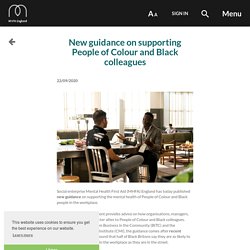
The free guidance document provides advice on how organisations, managers, and colleagues can be better allies to People of Colour and Black colleagues. Created with support from Business in the Community (BITC) and the Chartered Management Institute (CMI), the guidance comes after recent research from YouGov found that half of Black Britons say they are as likely to have experienced racism in the workplace as they are in the street. The guidance is released as part of the next stage of MHFA England's My Whole Self campaign, which calls for inclusive and empowering workplace culture change. Research from the campaign found that less than half (43%) of UK employees think their colleagues know the 'real' them.
Simon Blake, Chief Executive of MHFA England said: To download the free guidance click here. What have you done since June? — Charity So White. I have lost count of the number of press releases I’ve seen since June that start with “The Black Lives Matter movement made us realise” or “In the year of Black Lives Matter”.
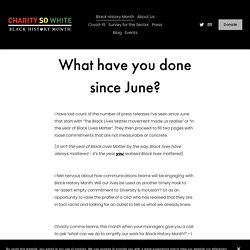
They then proceed to fill two pages with loose commitments that are not measurable or concrete. (It isn’t the year of Black Lives Matter by the way, Black lives have always mattered - it’s the year you realised Black lives mattered). I feel nervous about how communications teams will be engaging with Black History Month. Will our lives be used as another timely hook to re-assert empty commitment to ‘Diversity & Inclusion’? Or as an opportunity to raise the profile of a CEO who has realised that they are in fact racist and looking for an outlet to tell us what we already knew. Charity comms teams, this month when your managers give you a call to ask “what can we do to amplify our work for Black History Month?” Building inclusive workplaces report sept 2019 tcm18 64154.
Becoming an anti-racist organisation · MHFA England. Many People of Colour and Black people say they have to hide parts of their identity at work.
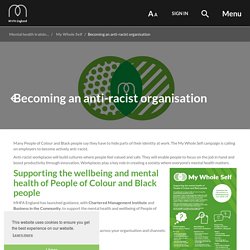
The My Whole Self campaign is calling on employers to become actively anti-racist. Anti-racist workplaces will build cultures where people feel valued and safe. They will enable people to focus on the job in hand and boost productivity through innovation. Workplaces play a key role in creating a society where everyone’s mental health matters. A leading agency specialising in diversity and inclusion within senior leadership. Charity So White. How to recruit diverse talent 0. What are the barriers to increased racial diversity within the third sector? – ACEVO. Menu What are the barriers to increased racial diversity within the third sector?
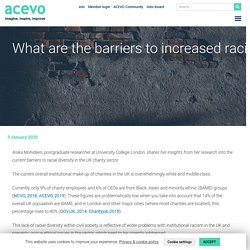
3 January 2020 Anika Mohideen, postgraduate researcher at University College London, shares her insights from her research into the current barriers to racial diversity in the UK charity sector. The current overall institutional make-up of charities in the UK is overwhelmingly white and middle-class. Currently, only 9% of charity employees and 6% of CEOs are from Black, Asian and minority ethnic (BAME) groups (NCVO, 2018; ACEVO, 2019). This lack of racial diversity within civil society is reflective of wider problems with institutional racism in the UK and presents unique ethical issues in the sector, which need to be urgently addressed. The third sector aims to improve access to opportunities, wealth, and privileges within socio-economically disadvantaged groups in the UK. This cycle causes a constant diversity deficit. The intersection of race and class Racist experiences at work Predominantly white management.
Acas advice and guidance. Unconscious bias can influence decisions in recruitment, promotion and performance management.
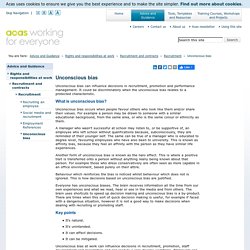
It could be discriminatory when the unconscious bias relates to a protected characteristic. What is unconscious bias? Unconscious bias occurs when people favour others who look like them and/or share their values. For example a person may be drawn to someone with a similar educational background, from the same area, or who is the same colour or ethnicity as them. A manager who wasn't successful at school may listen to, or be supportive of, an employee who left school without qualifications because, subconsciously, they are reminded of their younger self. Another form of unconscious bias is known as the halo effect. Behaviour which reinforces the bias is noticed whilst behaviour which does not is ignored. Everyone has unconscious biases. Key points It's natural.It's unintended.It can affect decisions.It can be mitigated.
Conscious thoughts are controlled and well reasoned. Name-blind recruitment.